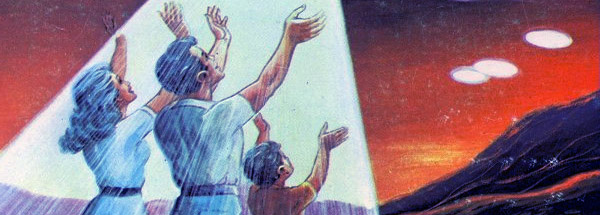
Features | Lists
By The Staff

30 :: Savages
Silence Yourself
(Matador)
It’s unquestionable that Savages’ aesthetic may strike certain listeners as being a touch severe. Consider: Silence Yourself’s cover art features a written manifesto in Helvetica font. They are notorious for requesting that concertgoers silence their phones at their shows (sadly unheeded judging from the New York City one I saw last month). Not to mention the sheer intensity of front woman Jehnny Beth: she’s a magnetic personality with the charisma of Siouxsie Sioux and the banshee howl of Rush’s Geddy Lee, but far more antagonistic than either. It’s strange, then, that most of the backlash against the hype Savages enjoyed earlier this year generally attacked two things: the transparency of their influences and their supposed lack of humor. But when Fay Milton is beating her ride cymbal during the chorus of “She Will” like it owes her money? When guitarist Gemma Thompson is using her Fender to emulate the sound of a butcher severing steer tendons in “Strife”? I don’t think anybody is stopping to think, “hey, this kinda sounds like Joy Division! But, y’know, a humorless Joy Division.”
That hype maelstrom was mostly a byproduct of critics getting their collective minds blown during the band’s strobe-heavy SXSW live shows. And while it’s the hoariest of clichés to note that a band “doesn’t fuck around” onstage, viewing a Savages show will allow one to truly appreciate the extent to which 99% of other bands really do fuck around, at least relative to this band. Silence Yourself offers up a tidy 38 minutes of the most visceral rock and roll of 2013. For example, when Ayse Hassan’s low-end bass throb interlocks with Thompson’s shards of feedback on “City’s Full,” it sounds less like a traditional rock band and more like the interwoven gearshift of a 19th century machine at the height of the British Industrial Revolution. The bridge in that song, where all of the instruments aside from Beth’s vocals drop out, only to be crushingly reintroduced with all of the subtlety of a slammed door, is arguably the peak head bang moment of 2013, rivaled only by, well, Milton’s aforementioned cymbal abuse. And much like Andy Gill before her, Thompson has minimal interest in chords relative to sounds. The closest thing she gets to a traditional riff is the ringing, Will Seargent-esque lead on “She Will,” and even then she can’t resist a dive-bombing trill at the chorus.
No one, least of all the band, will debate that Savages draw heavily from the darker aspects of early ’80s British post-punk. But when the end result is this exciting, who cares that the bass player has obviously spun Unknown Pleasures (1979) half a dozen times? With Silence Yourself, Savages are entirely in touch with both their strengths and their aesthetic, presenting a fully formed vision on a classic debut album. My biggest concern has nothing to do with the Joy Division of it all; rather, it’s that like Violent Femmes (1983) and Is This It? (2001), Silence Yourself is perfection on the first attempt, and impossible to follow up.
David M. Goldstein

29 :: Janelle Monáe
The Electric Lady
(Wondaland Arts Society/Bad Boy)
I always imagined The ArchAndroid (2010) on stage, Wondaland a parallel world Monaé created to tell a story of artistic ambition and musical eclecticism. There’s a world for The Electric Lady as well, only it’s very much ours. PoC and the LGBTQ community are here translated as Androids, literally “almost-humans,” and the record becomes one of solidarity. Monaé, as android alter-ego Cindi Mayweather, sings of struggles with intelligibility and equality in a straight white male-dominated world, and draws a line in the sand. On the fiery “Q.U.E.E.N.,” for instance, she taunts those who would judge her for existing outside the norm: “They say ooh, let them eat cake / But we eat wings and throw them bones on the ground,” goes one particular sneer. It’s cocky and sarcastic, perhaps the first moment from 2013 that could be classified as ***Flawless.
This attitude extends to the rest of The Electric Lady. It makes for a lot of killer songs, though not every one is as explicitly political as “Q.U.E.E.N.” Instead, much of the record is self-evidently powerful. The album’s two halves present that power in different ways: the first is straight fire, and loaded with guests (Prince, Erykah Badu, Solange, Miguel); the second, a series of gorgeous reminders of her considerable skill with ballads, with the odd soul-funk jam thrown in. Though less cohesive than the mostly guest-less back half, it’s the first suite, with tracks like the opening, almost invasive strut of “Givin’ Em What They Love,” and the furious “Cold War”-sequel “We Were Rock ‘n’ Roll,” where Monaé sounds most assured. I mean, it’s Janelle Monaé; of course she’s brimming with self-confidence and resilience (from “Victory”: “Will I rise? / Oh, I’ll just keep singing until the pain goes”). The Electric Lady is an album about attitude, about that self-confidence, and at its very best about directly confronting social constrictions with laughter—fun itself being a rebellious act. Perhaps her oeuvre can best be explained by her recent performance on Letterman: when she tore down the set with “Dance Apocalyptic,” it was more than just a wild freak out. It was Monaé reasserting, on the desk of one of the oldest, whitest guys on television, that she would not be ignored.
► “Primetime”
► “Givin’ Em What They Love”
Adam Downer
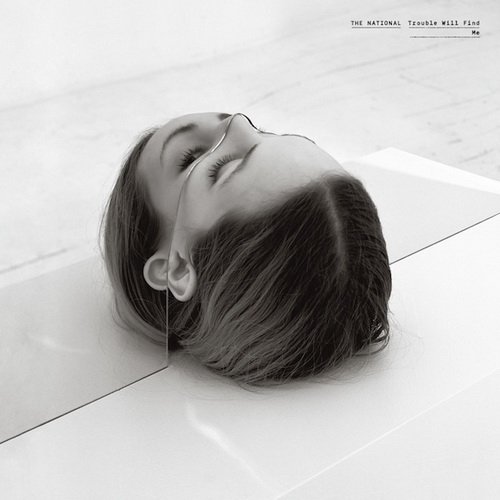
28 :: The National
Trouble Will Find Me
(4AD)
Let’s give the National credit where it is due. Clearly they had already mastered their chosen genre of sophisticated, late-night indie rock with the type of dark atmosphere and string orchestrations that thirty-something Brooklyn-ites crave. Their mid-2000s three album run from Alligator (2005) to High Violet (2010) is nearly unparalleled in both quality and consistency, and apparently Matthew Berninger and the brothers Dessner and Devendorff considered this to be a problem. Because seriously, how many times can the same critics reference Tindersticks and use the phrase “whiskey-soaked” to describe one man’s voice? Doesn’t the band get tired of constantly being asked if they’re really that depressed?
And with Trouble Will Find Me, the answer to that question would appear to be YES! It takes massive stones to identify when a change to your established sound is imperative to both career longevity and personal wellness. So while Trouble Will Find Me’s headlong dive into mainstream EDM may have been unexpected, it has the potential to pay dividends down the road, both in terms of Ibiza headlining slots and vodka ad syncs. Eyebrows a plenty were raised when it was leaked that the band had scuttled longtime collaborator Peter Katsis in favor of collaborating with David Guetta, but the transition is not nearly as drastic as was once feared. Matthew Berninger’s baritone is surprisingly compatible with AutoTune, and you haven’t lived until you’ve seen the Molly-spun youth of today reach skywards during the enormous bass drops of new Electric Daisy Carnival standards like “Pink Rabbits” and “Don’t Swallow the Cap” (though rest assured the audience has swallowed all of theirs).
Whether or not their established fanbase will be entirely on board with the new look National remains to be seen, but they somehow cracked our Top 30, and the non-stop promotion of “Sea of Love” on NYC dance staple WKTU can’t be wrong. The band has always been adept at playing to their strengths, but up until Trouble Will Find Me, no one had any reason to believe that such strengths also included ecstasy-driven thump in addition to hardcore brooding. They deserve the right to earn a living.
▲ “I Should Live in Salt”
▲ “Don’t Swallow the Cap”
David M. Goldstein

27 :: Boards of Canada
Tomorrow's Harvest
(Warp)
Tomorrow’s Harvest wrings its hands. It’s largely suspended in anticipation, on stage in perpetual twilight. Granted, it just being the first Boards of Canada album since 2006, nostalgia is something inevitable. But Boards of Canada play in the semi-anaesthetized, music-memories area of your brain like My Bloody Valentine plays distortion. There are wan lights and pound of beats, vistas and subcutaneous murmurs. This is an ambient electronic music album. But for you they recreate a sensation that’s eerily like déjà vu. Or is just: eerie. And confoundingly beautiful. Like walking through a memory in a hypnotic state, they source and explore moments that I feel like I remember. Or should. Specifically: how the influence of a million movie soundtracks allows them to trigger those synapses in our head that house memories of watching movies in the ’80s and having a first strange, terrified dream of E.T. Vaguely: they feel familiar, to the extent that I can’t tell if I’m accessing memories, or if they’ve annexed a part of me that hasn’t, until now, existed before. They feel familiar, and yet in Tomorrow’s Harvest Boards of Canada is on the verge of something that’s maybe not terrible, but is horrifically unknowable. Theirs is a sound that’s recognizable, but there’s terror in us not knowing exactly why. Or how. Because Tomorrow’s Harvest is an album of pre-cursors and nostalgia with no decipherable end. It’s memory, and a map, and you’ll follow without conclusion.
► “Reach for the Dead”
▲ “Come to Dust”
Kaylen Hann

26 :: James Blake
Overgrown
(ATLAS/A&M/Polydor)
Can we take a second to appreciate how pretty James Blake is? I know it’s probably been said before, but ever since I saw him live, I’ve been dying to write something about how pretty he is. He’s got such affable British mannerisms and soft facial features; were he to appear for thirty seconds on a BBC television show I swear Tumblr would lose its mind. Pictures and videos don’t do him justice, folks. Man’s a gorgeous thing to behold. And—awesome segue alert!—so is his music. I saw Blake after giving Overgrown a brief once-over; I admittedly struggled with his self-titled, and even after hearing Overgrown I was pretty certain that what I considered very quiet records would obviously translate to a quiet evening of sipping $8 PBRs and occasionally nodding my head. What I got was a suh-leek dance party where tracks I thought of as whispers shook the walls and vocal lines I thought of as one man’s introspection became the thread connecting a crowd. You wouldn’t think you’d feel brotherly love at a Blake show, but hey, Philadelphia, right?
Perhaps connection is more important to James Blake’s art than we give him credit for. On his last album, when he hummed, “I don’t know about my dreams, all that I know is I’m fallin’” over and over again until the words became nothing, it was as though he stood for a mercurial expression of an inner self. But look at Blake in 2013: he has a collaboration with RZA, a video where he goes joy-cruising with Chance the Rapper, and I think he’s bro-ing out with Kanye now. The guy’s opening up, and you can hear it in his music, too. Overgrown has a similar eerie-crooner vibe to his first album, but the polish somehow makes it seem more extroverted? “Retrograde” is actually fresh, and “Digital Lion” has an honest-to-god drop that brought Philly’s Theatre of the Living Arts to its knees. When it did, Blake smiled the smile of a guy who loves what his music does to people. Overgrown feels like the build right before the drop: you sense his star coming, and when it hits, oh, how pretty it will be.
Adam Downer
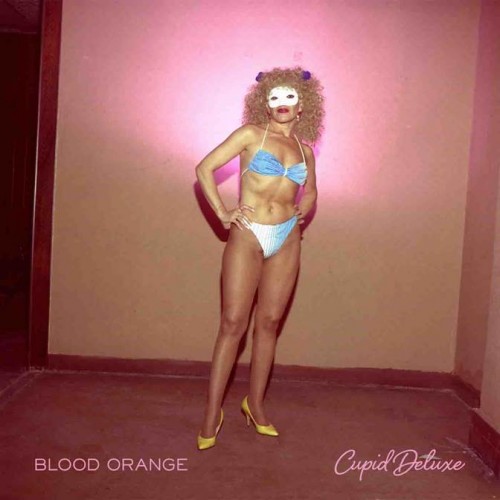
25 :: Blood Orange
Cupid Deluxe
(Domino)
Cupid Deluxe is the smooth, bass-slapping sound of Dev Hynes finally grabbing the brass ring with one leather-gloved hand, his other hand planted firmly—fingers splayed—on his own crotch. He’s standing on top of a car, yeah—a Delorean would be too on-the-nose, so probably an ’82 Pontiac Trans-Am, with those headlights that raise up out of little doors on the hood, like a cokehead’s eyeballs bulging right after the sixth bump of the night. As soon as his fingers touch the button-fly on his jeans the car’s windows explode. You know the drill. We’ve been here before, but damn if it doesn’t sound better than ever.
As Blood Orange, Hynes makes no attempt to apologize for lifting vast swaths of tone and stylistic tricks from wildly popular pop music trends spanning the late ’70s to 2013. There’s Michael Jackson in plenty of his career’s stages, yes, but also disco, house, funk, the earnest side of early rap, and the slick melancholy of early 2010s electro-pop. Hynes’s remarkable talent as an arranger keeps Cupid Deluxe from slipping into mere pastiche; his curatorial ability to synthesize these styles into a seamless, album-long sound pushes Cupid Deluxe way past the sum of its parts. Even better, the album’s numerous guests—bassist David Ginyard is the album’s MVP, but we also have indelible contributions from Caroline Polachek, Despot, Skepta, and Samantha Urbani—contribute such fantastic textures to the record that it would be unimaginable to think of it without them. Tracks like “Chamakay,” “On the Line,” and “Chosen” ache with a type of beauty that can only exist when it’s mixed with melancholy; the juxtaposition makes this beauty pop against such a dark background. You’ll have to forgive the earnestness there—Cupid Deluxe leaves no room for self-consciousness. Dance like no one’s watching, and then never ever mention again that I said that.
► “Chamakay”
► “You’re Not Good Enough”
Corey Beasley
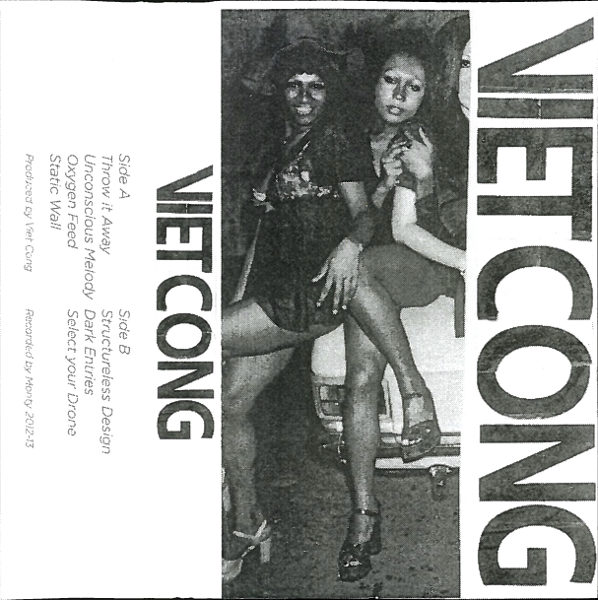
24 :: Viet Cong
Cassette EP
(Self-released)
Instantly familiar yet intimately strange, Viet Cong’s debut EP Cassette tries to weave together a fractured identity under a welcoming guise. What can we say about the band Women that isn’t, honestly, told in this music itself? Yet Viet Cong’s perspective is so close to subject, it feels like they might be talking about something else entirely. And, in fact, they are. Cassette has not a lick of nostalgia or reverie, it is a forward glide on a new trajectory. It is lo-fi indie rock, check, but there is a preoccupation here with boiled down concepts (named in the song titles) and emotional content not heard frequently in Women’s work. The lyrics are scrutable, by golly, while Matt Flegel’s vocals are more plaintive than his former band. And rightly so.
It’s not pop music about heartbreak, really, but damn if there ain’t a lot of brokenness in it. And yet it is comely, warm, those vestiges of Spector pop still present in this new outfit (look no further than the opener “Throw It Away”) while Viet Cong still and also find a point of attack through the mores of post-punk and post-rock, even with melodies and vocals more front and center. “Unconscious Melody” is a revelation, one of those perfect marriages of DIY aesthetics with immaculate songcraft; it’s probably the best track on the thing, but in terms of Viet Cong’s ambitions it’s just the harbinger. The dynamics to these songs alternate between measured and restless: “Static Wall” feels like a master class in how to take, very gradually, a go-nowhere progression somewhere sublime, while “Structureless Design” is true to its name and comments rather darkly on societal or at least personal ADD, flitting from one thought to the next, devouring and searching, unsatisfied.
There’s a bit of a fever to Cassette, as if it is both aware and breathing and yet can’t seem to look backwards, and in that inability there’s a sort of sickly pall. And the record is more interesting for it. Closer “Select Your Drone” is a serious jam and is, perhaps and at last, that eulogy we’ve been straining to hear, for in its brute efficacy and modulations on closure it recalls Women’s “Eyesore.” Or maybe it’s just that we all carry with us a few things that are doomed/blessed to repeat, even things that aren’t wholly our own, and in art we can’t help but reap that harvest. Cassette is, most assuredly, a blessing.
Chet Betz

23 :: Pharmakon
Abandon
(Sacred Bones)
Rheumatically speaking, Abandon is every creak in every joint you’ve ever had. Every pain that is good but also not good. Every time you thought a pain was gone but there it was again. Like weather. Raccoons. Maggots. Fingernails. Abandon takes place in a forest, maybe. It has setting, though its setting doesn’t matter one bit. That forest—if it even is a forest—is dying, or dead; though there is evidence of new life, that evidence in turn suggests evidence of death in that life, and life in that death, and it keeps drilling down until every little damn thing is kaleidoscopic: rigid and crystallized. Time is meaningless, because for all the rhythmic churning on this album, what it shows you is remarkably still. You can still feel it: nails on your skin, grime on your feet, dust in your eyes. You heart is vulnerable to these feelings, but this is still just a picture of your heart, still; your heart doesn’t matter, even as it matters the most. Every movement is arthritic; every arthritis is bursting with desire; every desire is subordinate to the movement required to express it. Maggots, milkweed, and music: you are living but you are also dying, so that’s what Abandon feels like. You are vital; you are caught; you are a rotting husk with limited shelf life. Every time you check a milk carton for the expiration date you should remind yourself that you have one too. Maggots love both; this album is a maggot’s love story.
These oxymorons are what makes Abandon seem so vital. The two voices that swirl through “Ache” are what is pitted in “Pitted”: the heart and the flesh, both grotesque, both feeling pain differently. The inside and outside are just different ways of being disaffected: from sensation, from feeling, from the body politic, from capitalism, from the patriarchy, from the ability to cook a perfectly soft-boiled egg. You are endless as you speed towards your end. You are epic in repetition. You are falling apart even when you feel the best about yourself. You are nothing more than an inflamed joint; it’s the connection itself that is the problem. Everything you think is meaningful can fall away, because everything will be dead, which means everything might as well be. Which is why you should care about what you do now; that’s what actually matters. Because, like, oh yeah: this super-confrontational noise album is actually all about hope and encouragement. Listen up, you worthless bags of bones.
► “Crawling on Bruised Knees”
► “Ache”
Mark Abraham

22 :: Waxahatchee
Cerulean Salt
(Don Giovanni)
When 24-year-old Katie Crutchfield sings lines like “I’m longing for my youth” it might well sound absurd. But Waxahatchee’s bracing Cerulean Salt, the fully realized follow up to last year’s stripped-down American Weekend, doesn’t treat youth as an age group. It’s instead a nebulous concept, synonymous with innocence, that floats perilously out of reach throughout the record as Crutchfield parses the casual ugliness of adulthood, wishing halfheartedly to crawl back into her childhood bed (from “You’re Damaged”: “You are eleven / 1997 / God is implicit / Your luck is consistent”). Cerulean Salt is a dramatic record; it’s even overwrought at times, though I’d argue necessarily so. Crutchfield manages to communicate with admirable potency the experience of being twenty-four. This is a task that requires sincerity and intimacy, two qualities that Cerulean Salt employs un-self-consciously as it delves into unspoken tensions, old friendships, and the paralyzing anxiety of growing up. “I will grow out of all those / Empty bottles in my closet,” she sings in the achingly beautiful “Swan Dive,” “And you’ll quit having dreams about / A swan dive to the hard asphalt.” Through the hindsight of experience, we might view this notion as a phase—but when Crutchfield sings these lines in her strong, clear voice, we feel all the pain and uncertainty of those moments, the times when we try desperately to make sense of where we’ve been, where we are, and where we’re going. And eventually we just give up, hoping it’ll work itself out. In thirty minutes of crisp, melodic alt-rock, Cerulean Salt will take you right back there, unapologetic, honest, and beautiful.
► “Swan Dive”
► “Coast to Coast”
Maura McAndrew
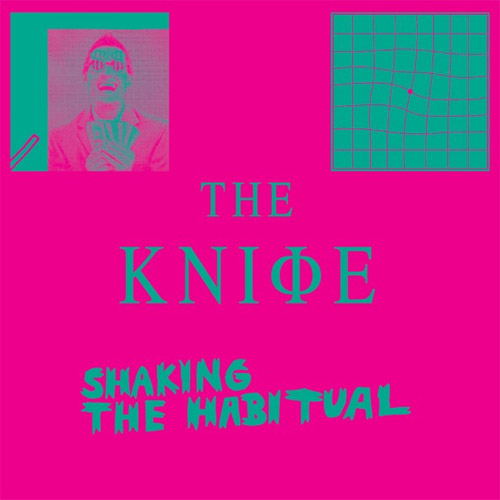
21 :: The Knife
Shaking the Habitual
(Mute/Brille/Rabid)
Seemingly fueled by confrontation, 2013 has certainly had its share of musical and extra-musical debate. There was, of course, Yeezus, which at the end of the day had little to offer besides ornery demeanor. But there was also Savages, who titled the first song on their debut album “Shut Up” (and, as David has already noted, they proceeded to make good on the invective by banning cell phones at their shows), as well as Kendrick Lamar’s guest verse on “Control,” a simultaneous roll-call of and call-to-arms against lazy hip-hop personalities. This is to say nothing of the ethical debates that have raged all year within the ever-compromised critical community itself. To put this in perspective, amidst this tense landscape another (terrible) new Death Grips record felt quaint by comparison. Swedish electronic duo the Knife brought a similar sense of provocation to their long-gestating fourth record, Shaking the Habitual, but I think it’s important to make a critical distinction: the Knife approached their targets from a far more subversive angle than many of their contemporaries.
This sociologically-engaged tact didn’t appear out of the blue, of course. The Knife’s music, much like kindred spirit Burial, has often betrayed an underlined gravitas even when the exact message hasn’t been clear. But where once the Knife offered missives shrouded in brittle beatscapes and synthetic shadows (“Neverland,” “We Share Our Mothers’ Health”), now they make directives launched in arcing, kaleidoscopic arrays across expansively outlined techno landscapes (“Full of Fire,” “Raging Lung”). In one sense, they’ve simply made the progressive politics of their earlier work literal; at the same time, Shaking the Habitual is also an open debate, and never once during the album’s 90-minute runtime do the Knife fail to implicate themselves or their audience in the complex tapestry of politics and personal interests the album critiques. These confrontational impulses also extend to the music: the band has never made songs this outwardly provocative, though even blatant hurdles like the 20-minute ambient excursion “Old Dreams Waiting to Be Realized” and the ten-minute industrial-noise barrage “Fracking Fluid Injection” have purpose: as a transitional piece between the record’s two discs, and as a penultimate palette cleanser, respectively. These pieces sit within the project’s greater conceptual strategy and highlight a concerted effort at maintaining a pointed aesthetic integrity.
For all its sonic perversions and potentially irreconcilable tangents, however, Shaking the Habitual is never less than totally listenable, even relatable. And this extends to the album’s aesthetic presentation: with its neon color scheme and comic book sloganeering (“END EXTREME WEALTH”), the album functions at once as a statement of purpose and as a self-consciously cartoonish approximation of naive antagonism, which goes some way toward leveling the playing field between band and listener. Olof Dreijer and Karen Dreijer Andersson, despite their sometimes severe preoccupations and theatrical stage presentation, are simply two people utilizing their talents and resources to hopefully move bodies and provoke thought without diluting either goal. Save for a few interviews, the Knife have gone uncomfortably silent in the wake of a short tour surrounding the record’s release in April, and given their tendency to decamp and regroup, this may be all we hear from the band, at least in recorded form, for the foreseeable future. Thankfully Shaking the Habitual speaks loudly, proudly, and provocatively for itself, and has the power and wherewithal to do so for years to come.
► “Full of Fire”
▲ “A Tooth for an Eye”





